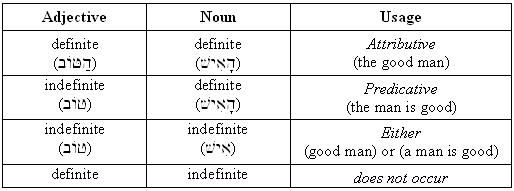|
|
 |
 |
|
The Predicate Usage of Adjectives
In English, a predicate adjective is a modifier that follows a linking verb (i.e., "is") and describes the subject. For example in the sentence, "John is tall", the adjective tall is being predicated about the subject, John.
In Hebrew, predicate adjectives can appear before or after the noun and agree in gender and number -- but not definiteness. In other words, if a noun is definite and the adjective is indefinite, the adjective is a predicate adjective. Note that a noun with a predicate adjective comprises a complete clause (in fact a complete sentence may be expressed with a predicate adjective and a noun, as you will see below).
Predicate adjectives have the following properties:
- They appear before or after the noun they modify
- They agree with the noun they modify in:
- Gender (masc / fem)
- Number (sing / pl)
- but not in definiteness
Examples:
|
 |
|
|
|

|
Notice that though both the noun and the adjective are masculine singular, they do not agree in definiteness. We would translate these words as "The man is old," supplying the linking verb "is" in our translation.
|
|
|
|
|

|
Notice that in this example, the adjective appears before the noun - the converse of the above example. We would again translate this as "The man is old" (or "Old is the man").
|
|
|
|
|

|
The masculine singular definite noun ha-ish ("the man") is modified by the masculine singular definite adjective hazzaken ("the old"). Since both the noun and the adjective match in gender, number and definiteness, we translate the phrase as "the old man." Note that this is an attributive - not predicative - usage of the adjective.
|
|
 |
|
|
|

|
Here the masculine singular adjective yapheh appears with the proper noun Yeshua. Translation: "Jesus is beautiful" (a true statement, as well).
|
|
|
|
|

|
The masculine plural noun habbanim appears with the masculine plural adjective chakhamim. The words agree in gender and number but not in definiteness, so the adjective functions predicatively: "The sons are wise."
|
|
|
|
|

|
In this case, though both the noun and the adjective agree in gender and number, they are both indefinite, so we can translate attributively as "an old woman" or predicatively "a woman is old," depending on the context.
|
|
|
|
|

|
In this example, two adjectives are combined to form a compound predicate adjective. We translate: "Good and upright is the LORD" (Psalm 25:8).
|
|
|
|
|

|
In this example, notice that there are two adjectives that are both modifying the same noun (old and heavy). We would translate: "The man is old and heavy" (1 Sam. 4:18). Note that kaved means "heavy."
|
|
 |
 |
|
Section Exercises
- Memorize the standard predicate adjective paradigm.
- Summarize the usage of predicate adjectives on a small flashcard (e.g., that they must agree in gender, number, but not definiteness). Provide simple examples to help you remember the rules.
- From the vocabulary you already know, create simple adjective phrases, such as "a woman is good," "the woman is good," "the man is wise," "Moses is old," and "the kings are evil."
<< Return
|
|












